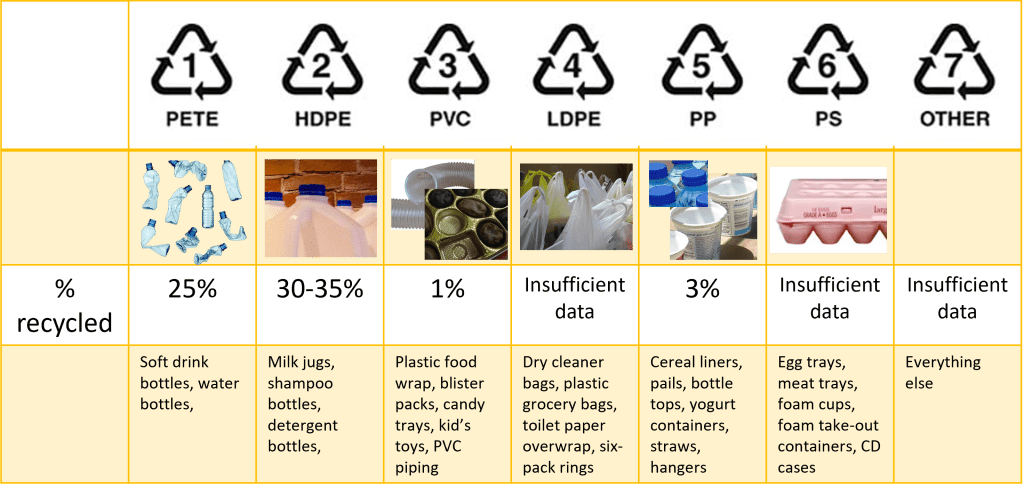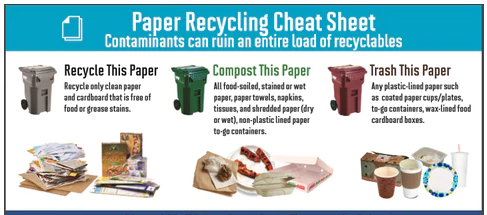Addressing the environmental impact of your life is overwhelming. But the good news is that small, simple, changes can have a big impact.
All those articles about how to form a habit? They are mostly backed by science. Start small. Make a specific goal. Reward yourself. So instead of buying a new car, water heater, or air conditioner, or even just throwing out all your plastic, pick just one thing, and build your way toward greatness. Below we offer two ways to get started: reducing your food waste and breaking up with plastic. Both are large contributors to climate change, and both can be tackled with habit changes.
Reduce, reuse, and recycle your food waste.
Addressing your food waste saves you money and makes a positive impact on climate change. Over 151 lbs of food is wasted per person per year in Georgia. This results in a loss of $1.92 Billion in Georgia alone each year. Food waste does not decompose properly in a landfill because it is not exposed to heat and light – so it produces methane gas instead. Food waste is responsible for approximately 8% of global greenhouse gas emissions.
- Reduce what you buy by planning your meals.
- Reuse what you make by having leftover nights.
- Recycle your nutrients via composting.
Learn more about how the food cycle affects you, your health, food insecurity, and the environment.
Break Up with Plastic
Single use plastic bottles one of the largest uses of plastic globally. Even if it says its recyclable – only 2% of plastic waste is recycled. In the best case, plastic waste at least ends up in a landfill. But oftentimes it goes into the environment where it becomes a microplastic. Microplastics end up in our lungs, our blood, our food, our water.
Take this NY Times quiz to understand the complexities of plastic recycling.
Overwhelmed? Breaking up with plastic is hard. It’s everywhere. Start small:
- Remember your reusable bag.
- Carry a reusable water bottle (Science for Georgia has some great options in our store)
- Look for products with reduced, or more sustainable, packaging.
Learn more about Single Use Plastics and how you can make a larger difference in Georgia.

The above graphic outlines the different types of plastics according to their numbers. Those with insufficient recycling rate data are at least less then 5%, but more likely less then 1%.
Compost vs. Recycling vs. Trash
| Material | Industrial Compost | Curbside Recycling | Trash |
|---|---|---|---|
| Paper | Shredded Paper (not recyclable) Food Stained Cardboard Paper towels, napkins Flour & sugar bags BPI Certified Compostable Cutlery & Plates Cardboard Egg Cartons | Sheets of Paper Clean Cardboard Paper towel & toilet paper rolls Gable Top (juice + milk) containers (leave the lid on) | Disposable coffee cups Disposable plates |
| Metal | NONE | Cans Tins Balled foil the size of a can | Aluminum Sheets |
| Glass | NONE | Bottle and jars (don’t forget to recycle the lid) | Glassware (cups, glasses, plates) Mirrors |
| Plastic | NONE | Hard Plastic – Check the Number! Soft Plastic – Grocery Store Only | Hard Plastic – wrong number Dirty Plastic Disposable Plastic Cutlery Most disposable Cups |
| Food Stuff | Fruit & Veggies Meat & Bones Lobster & shrimp shells Eggs, egg shells Pet food Cooled grease and fats Cheese and dairy | NONE | Oyster, clam, mussel shells Cheese Wax, Candles, Gum |
| Other Waste | Plant Material | Pet waste Cat litter Cigarette Butts Rubber bands & gloves |
Hard to recycle things – Styrofoam, electronics, paints, chemicals, etc. Check with CHARM a local Atlanta Hard to Recycle service.
Wait – where does paper go?
- Is it dry & flat? Recycle it.
- Is it wet, shredded, or food stained? Compost it.
- Does it have a lining? Trash it.

About Science for Georgia
Our mission rests on three pillars:
- Improving communication between scientists and the public. In 2022, we reached over 190 S&T professionals via our SciComm Academy.
- Increasing public engagement with science. In 2022, Atlanta Science Taverns and Science Stand Up Comedy had over 300 attendees each.
- Advocating for the responsible use of science in public policy. We helped pass a resolution to look for literacy solutions in Georgia (only 30% of Georgia kids can read proficiently) and our open letter from science is being used to defend of Okefenokee from mining.
Read More & Sources
5 Common Recycling Mistakes and their Zero Waste Swaps
Circular Claims Fall Flat Again
Mythbusting: 10 Common Misconceptions About Recycling and Composting
